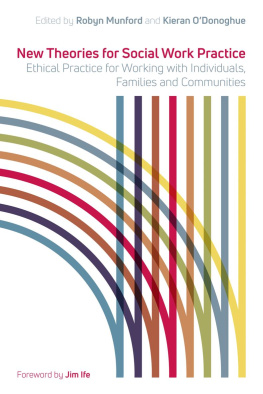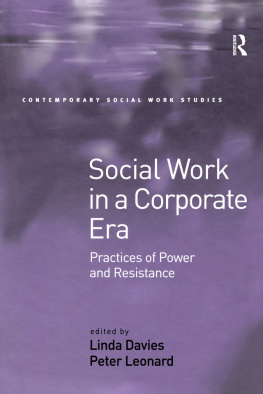POVERTY, INEQUALITYAND SOCIAL WORK
The impact of neoliberalism and austerity politics on welfare provision
Ian Cummins
First published in Great Britain in 2018 by
Policy Press University of Bristol 1-9 Old Park Hill Bristol BS2 8BB UK Tel +44 (0)117 954 5940 e-mail
North American office: Policy Press c/o The University of Chicago Press 1427 East 60th Street Chicago, IL 60637, USA t: +1 773 702 7700 f: +1 773-702-9756 e:
Policy Press 2018
British Library Cataloguing in Publication Data
A catalogue record for this book is available from the British Library
Library of Congress Cataloging-in-Publication Data
A catalog record for this book has been requested
ISBN 978-1-4473-3482-8 paperback
ISBN 978-1-4473-3480-4 hardcover
ISBN 978-1-4473-3483-5 ePub
ISBN 978-1-4473-3484-2 Mobi
ISBN 978-1-4473-3481-1 ePdf
The right of Ian Cummins to be identified as author of this work has been asserted by him in accordance with the Copyright, Designs and Patents Act 1988.
All rights reserved: no part of this publication may be reproduced, stored in a retrieval system, or transmitted in any form or by any means, electronic, mechanical, photocopying, recording, or otherwise without the prior permission of Policy Press.
The statements and opinions contained within this publication are solely those of the author and not of the University of Bristol or Policy Press. The University of Bristol and Policy Press disclaim responsibility for any injury to persons or property resulting from any material published in this publication.
Policy Press works to counter discrimination on grounds of gender, race, disability, age and sexuality.
Cover design by Qube
Front cover image: Shutterstock
Reader's Guide
This book has been optimised for PDA.
Tables may have been presented to accommodate this devices' limitations.
Image presentation is limited by this device's limitations
Acknowledgements
Isobel Bainton, Helen Davis, Shannon Kneis, Ruth Wallace and all the staff at Policy Press have been unfailingly supportive of the project. Thank you.
This work is based on my social work practice, teaching and academic research. I would like to thank my social work students who have listened to and helped shape my ideas. I am very grateful to the anonymous reviewers of the original proposal and a draft of the work. Their contribution has been invaluable in shaping the final version. I was honoured that Dr Emily Keddell and Dr Jo Warner two social work academics I hold in the highest regard took the time to read a draft of the book. I, of course, take full responsibility for the final version. Thank you.
My pals on Twitter (some of whom are real people) @asifamhp, @SchrebersSister, @Hannah_Bows, @bonklesoul, @AcademicDiary, @BenHCarrington, @DrImogenTyler, @Stephen_A_Webb you have helped in shaping my ideas in a number of areas that are explored in this work. Thank you.
The work of Paul Michael Garrett has been a key influence on my approach to these issues if only he could be encouraged to write more.
I am particularly grateful for the support and encouragement of my friends Janet Chapman, Emilio Jose Gomez Ciriano, David Edmondson, Akwugo Emejulu, Marian Foley, Jameel Hadi, Stephen Jones, Gavin Kendall, Martin King, Jadigwa Leigh, Jane Lucas, Bernard Melling, Bryn Morris, Lisa Morriss, Emma Palmer, Kate Parkinson, Donna Peach, Dave Platten, Nick, Platten, Sarah Pollock, Barry Schilling and Jonathan Simon.
I would like to thank my sisters, brother and late mother for the support they have given me. My mother loved books, and I hope that she would have enjoyed this one.
This work is dedicated to my wife, Marilyn, and to my sons, Nelson and Elliot.
If we had a keen vision of all that is ordinary in human life, it would be like hearing the grass grow or the squirrel's heart beat, and we should die of that roar which is the other side of silence.
(George Eliot, Middlemarch, 1863)
Contents
List of tables and figures
Tables
Figures
Foreword
As Simon Fuller wrote in his introduction to The Poetry of Protest in 1991: 'In some situations the art of writing is itself a protest'. In the situation we find ourselves now, in which inequality has risen inexorably after decades of neoliberalism and years of austerity, we need to protest through all the means we can muster.
In April 2017, a group of social workers protested against the politically-driven austerity measures of the last two Governments, and the social and human devastation they are leaving in their wake, by walking 100 miles from the head office of the British Association of Social Workers (BASW) in Birmingham to the venue of its 2017 conference in Liverpool. The idea for this walk emerged from reading other pages that first documented and then inspired protest, namely an article by Psychologists Against Austerity published late in 2016 by the Critical and Radical Social Work journal. The social actions described in this article included 'Walk The Talk', in which a group of psychologists walked from the offices of the British Psychological Society in Leicester to offices in London to raise awareness of social policies that were leading to psychological distress.
Almost as soon as I had finished reading this article and put the journal to one side, I checked my 2017 calendar and the distance from Birmingham to Liverpool. I shared the beginnings of my idea with BASW colleagues and their positive responses led to the birth of Boot Out Austerity. We would walk an average of 15 miles a day for seven days, holding rallies and meetings each morning and evening, and visit social care organisations affected by austerity along the route.
We gathered at the yet-to-be-opened new BASW head office on Waterloo Street in Birmingham on Wednesday 19th April 2017, the day after Theresa May had called a snap General Election. She said she wanted a mandate to take into the soon-to-begin Brexit negotiations, whereas the Boot Out Austerity walkers were not alone in believing the key electoral battles would be fought on the fields of austerity, poverty and inequality.
One of the most egregious effects of austerity has been the huge increase in rough sleeping, with a quadrupling of the number of rough sleepers in Birmingham over a six year period, and some had been bedding down for the night outside the empty building BASW was to move into. We had chosen a theme for each day of the walk, a particular field affected by austerity, and on that first day we focused on housing and homelessness. The opening rally included speakers from the Axe The Housing Act Campaign and Birmingham Christmas Shelter, who laid bare the impact of the reduction of available social housing, welfare reform and benefit cuts on meeting this most fundamental need for many of our fellow citizens.
We heard from other speakers too, including from the International Federation of Social Workers, the local BASW branch and the Social Workers Union. And there was music, political songs from the Banner Theatre and a piece composed especially for us by a student from the Birmingham Conservatoire, A Blast for Boot Out Austerity! The morning rallies on the other days were all in a similar vein, with poetry added in to the mix, one of the walkers reading out the daily poem written by our resident Poet Austeriate about the previous day's theme and happenings.







